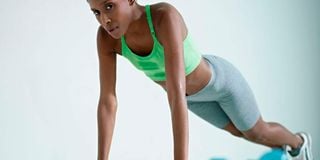How to plan your diet for optimal workout results

Salts and minerals are part of electrolytes that balance the amount of water.
What you need to know:
- You should only eat or drink if you are planning to exercise for more than one hour.
- Rehydrate after vigorous exercise.
- Your post-exercise meal should be well balanced. Do not take a lot of proteins, fat, or carbohydrates at the expense of other foods.
Food plays an important role in building abs. The food you eat before, during, and after exercising can determine whether you’ll be stuck in an endless unhealthy cycle or if you will realise your health dreams.
What to eat before your exercises
According to Johns Hopkins registered dietitian Kathleen Johnson, you must be well hydrated before you start your exercise routine. She recommends taking plain water instead of sports drinks which contain sugar and calories. When heading out for exercise, do not experiment with foods you haven’t eaten before, especially if you are susceptible to bloating and gas. After a heavy meal, wait at least three hours before you start your exercises. However, the United Kingdom’s NHS global dietary guidelines state that one hour before your routine starts, you can take a snack that contains some protein, but which is higher in carbohydrates and low in fat. This should also be a snack that your body will be able to digest quickly such as porridge, a glass of milk, yogurt, banana, or wholegrain bread. “Foods that can result in discomfort if taken just before an exercise routine include avocados, chips, and cheese in large quantities. These are fatty foods. High-fibre cereals, raw nuts and seeds, and raw vegetables; these are high-fibre foods,” the NHS states. According to Kathleen, one of the best ways to match your diet with your exercises is to arrange for evening workouts. That way, you will be able to have a good lunch or pre-workout snacks without eating whatever is available in the heat of the moment just because you’re hungry but have to rush out for your exercise. Drink lots of water throughout the day to stay well hydrated.
Food and drinks during exercise
You should only eat or drink if you are planning to exercise for more than one hour. However, if you have a health condition such as poor blood sugar control, Kathleen suggests you have coconut water with you. This is echoed by the NHS guidelines which recommend that when exercising for longer periods, you could take carbohydrates that are digested fast or salts and minerals such as a banana cereal bar or a glass of milk. Salts and minerals are part of electrolytes that balance the amount of water in your body which is then lost through sweat during an exercise.
What to eat after exercise
Rehydrate after vigorous exercise.
According to Kathleen, your post-exercise meal should be well balanced. Do not take a lot of proteins, fat, or carbohydrates at the expense of other foods.
“Get a balanced meal. For proteins, you can go for fish, beans, or lentils. For carbohydrates, opt for fruits and vegetables that give carbs. With fats, you can go with fish and olive oil or avocados,” she says. In the same vein, the NHS recommends that when trying to lose weight, be careful about what you eat after the exercises. This is to avoid taking in too much energy foods. For example, if you consume more energy than you burned out when exercising, you may find that you have gained weight instead of losing despite doing your exercises without fail. At the same, putting your body through pain to lose weight may not be the best weight loss strategy. Instead, eat lots of fruits and vegetables.
Quick Takeaway
According to the NHS guide, healthy sources of:
Carbohydrates are wholegrain bread and breakfast cereals, potatoes, brown rice, fruits, and whole wheat pasta.
Proteins are poultry products such as chicken and eggs, milk, yogurt, cheese, beans, peas and lentils, fish, minced meat, and other lean cuts of meat.





